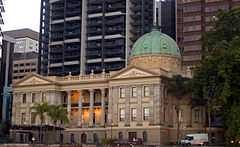Customs House, Brisbane
| Customs House | |
|---|---|
 Customs House from the Brisbane River | |
| General information | |
| Architectural style | Victorian Free Classical |
| Location | Brisbane, Queensland |
| Address | 399 Queen Street, Brisbane |
| Coordinates | 27°27′56″S 153°01′52″E / 27.465465°S 153.031113°ECoordinates: 27°27′56″S 153°01′52″E / 27.465465°S 153.031113°E |
| Current tenants | University of Queensland |
| Construction started | 1886 |
| Completed | 1889 |
| Renovated | 1994 |
| Cost | ₤38,346 |
| Owner | Government of Australia |
| Technical details | |
| Floor count | 3 |
| Design and construction | |
| Architect | Charles McLay |
| Architecture firm | Queensland Colonial Architect's Office |
Customs House is a heritage-listed customs house located on Queen Street by the Brisbane River in Brisbane, Queensland, Australia. It was originally used for the collection of customs duty and was both completed and opened in 1889,[1] when Queensland was a British colony, replacing the original Customs House located at Petrie Bight.
The collection of custom duties on imported products was particularly important to Queensland where the manufacturing sector was slow to develop.[2] Brisbane was declared a port city in 1846. In 1908, seven years after federation, the building was acquired by the federal government.[2]
Customs House is within reach of the CityCat catamaran ferry service, as well as the Free Loop Bus.
Construction and design
Construction was finished in three years at a cost of ₤38,346.[3] The downstream end of the Brisbane central business district was selected to spur the development of wharves in the precinct known as Petrie Bight.[4] The lower floor contained a secure warehouse where goods not having been passed customs were stored.
Customs House is a Brisbane landmark known for its distinctive copper dome.[4] The building was designed by Charles McLay of the Queensland Colonial Architect's Office.[5] Despite no government in the country having a coat of arms at the time, the building features a depiction on its facade of a shield between an emu and kangaroo.[1] An iron balustrade was shipped from England with the initials VR for Victoria Regina wrought on it in honour of Queen Victoria.[2] Inside the structure features black and white marble with cedar fittings.[5]
Current use
The building became redundant when port facilities moved to the Port of Brisbane at the mouth of the Brisbane River, resulting in its closure in April 1988.[5] The building is now leased by the University of Queensland and was refurbished between 1991 and 1994, at a cost of A$7.5 million.[5] There is a restaurant and function centre within the building, and regular concerts and an art gallery occupies the lower floor.[2] The Long Room was once the place customs business was transacted.[4] Today the room is used for various functions, lectures and dinners.
Heritage listings
The building was registered on the now defunct Register of the National Estate in 1980.
The building was listed on the Queensland Heritage Register in 2005.[6]
Gallery
-

Customs House, Brisbane, ca. 1906
-

Customs House illuminated for the Duke of York's visit to Brisbane in 1901
-

Customs House from the Brisbane River
-

Street view looking south
-

Interior of Customs House, Brisbane set up for a wedding reception
References
- ↑ 1.0 1.1 Readshaw, Grahame; Ronald Wood (1987). Looking up looking back at old Brisbane. Bowen Hills, Queensland: Boolarong Publications. p. 38. ISBN 0-86439-032-7.
- ↑ 2.0 2.1 2.2 2.3 Gregory, Helen; Dianne Mclay (2010). Building Brisbane's History: Structure, Sculptures, Stories and Secrets. Warriewood, New South Wales: Woodslane Press. pp. 22–23. ISBN 9781921606199.
- ↑ "Customs House: History". University of Queensland.
- ↑ 4.0 4.1 4.2 Gregory, Helen (2007). Brisbane Then and Now. Wingfield, South Australia: Salamander Books. pp. 20–21. ISBN 978-1-74173-011-1.
- ↑ 5.0 5.1 5.2 5.3 Hacker, D. R. (1999). Petries Bight: a Slice of Brisbane History. Bowen Hills, Queensland: Queensland Women's Historical Association Inc. p. 12. ISBN 0-9590271-8-1.
- ↑ "Brisbane Customs House (former) (entry 14931)". Queensland Heritage Register. Queensland Heritage Council.
External links
| Wikimedia Commons has media related to Customs House, Brisbane. |
- Customs House - Official University of Queensland information site
- Queensland Government - EPA Customs House
- "Entry AHD8335". Australian Heritage Database. Department of Sustainability, Environment, Water, Population and Communities.
| ||||||||||||||||||||||||||||||||||